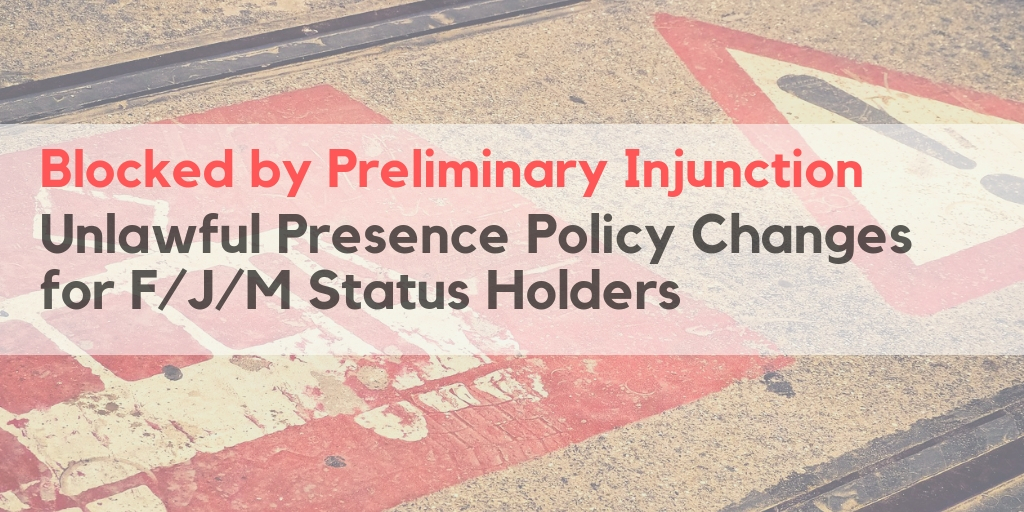Federal District Court Blocks Temporarily USCIS Unlawful Presence Policy for F, J and M Nonimmigrants
A district court judge for the Middle District of North Carolina has issued a nationwide preliminary injunction, effective immediately, enjoining USCIS’s memo titled “Accrual of Unlawful Presence and F, J, and M Nonimmigrants,” (see our article and analysis on the initial memorandum) originally issued on May 10, 2018, and updated on August 9, 2018, that went into effect on August 9, 2018, until further order of the court.
The Guilford College v. McAleenan Preliminary Injunction
On May 3, the U.S. District Court for the Middle District of North Carolina issued a decision in the F, J and M unlawful presence litigation which had sought to invalidate the USCIS August 9, 2018 Policy Memorandum regarding F/J/M Unlawful Presence. The judge’s decision rejected the government’s Motion to Dismiss on standing and ripeness grounds and granted the plaintiffs’ Motion for Preliminary Injunction. As a result, the decision blocks implementation “in all applications” of the USCIS August 9, 2018 Policy Memorandum that had essentially changed many years of USCIS policy regarding unlawful presence for foreign nationals in D/S status.
The court granted the preliminary injunction to have nationwide impact because of the “likelihood of success” on the merits of the plaintiffs’ challenges to the unlawful presence memorandum. As a result, as of May 3, 2019, USCIS is barred from taking action in accordance with the August 9, 2018 Policy Memorandum.
It should be noted, however, that this is a preliminary injunction and it given the accelerated nature of this litigation, some decision is expected in the summer. A decision is likely to be appealed by the losing party as well. Overall, we expect the August 8, 2018 Policy Memorandum to be blocked for at least a few months.
Background on the F/M/J Unlawful Presence Policy
In a Policy Memorandum dated May 10, 2018 and effective as of August 9, 2018, U.S. Citizenship and Immigration Service (USCIS) changed the way it treats non-immigrants who are in the U.S. on F, J and M status and, specifically, when such non-immigrants either complete/stop their program or violate the terms of their status. Previously, F/J/M non-immigrants had to be formally deemed to have violated status to be considered unlawfully present. Under the new policy, completion of the F/J/M program or violation of the terms of status start the period of unlawful presence which can then lead to a ban on entering the U.S.
Practical Significance of the Preliminary Injunction and What is Next?
It is important to highlight again that this is a preliminary injunction based on the “likelihood of success” on the merits; however, there is no certainty regarding the ultimate decision on the merits. Students and scholars who may possibly be affected by the Policy Memorandum should plan carefully and possibly avoid international travel and F/M/J status compliance steps before a final decision on the merits is issued, likely in June or later in the summer.
Conclusion
Our office will continue to monitor developments relating to how this litigation will unfold over the next several months. We continue to caution F/J/M non-immigrants to be very vigilant with respect to maintaining valid status and not engaging in what may be considered to be “unauthorized activity”. We continue to encourage DSOs play a much more active role in helping F-1 students and their dependents understand what they can and cannot do in order to maintain status.
Please feel free to subscribe to our free weekly newsletter to obtain developments on this and related topics. If our office can be of any help, we have a number of phone consultation and contact options.
Related News and Articles
The Capitol Immigration Law Group has been serving the business community for over 15 years and is one of the most widely respected immigration law firms focused solely on U.S. employment-based immigration. Disclaimer: we make all efforts to provide timely and accurate information; however, the information in this article may become outdated or may not be applicable to a specific set of facts. It is not to be construed as legal advice.

